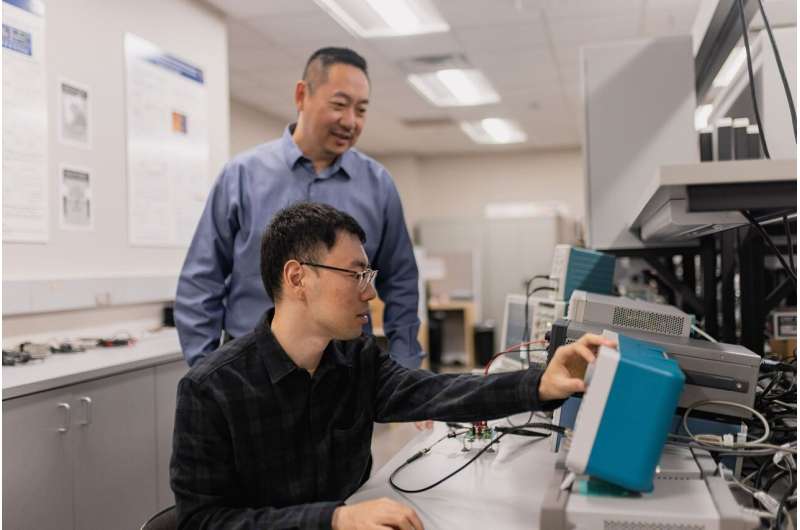This article has been reviewed according to Science X's editorial process and policies. Editors have highlighted the following attributes while ensuring the content's credibility:
fact-checked
peer-reviewed publication
trusted source
proofread
Researchers develop technology to protect EVs from chip 'noise'

University of Texas at Dallas researchers have developed a first-of-its-kind technology to detect and reduce "noise" from electromagnetic interference (EMI) in electric vehicles. Such interference can cause malfunctions, such as providing incorrect navigation or compromising collision-avoidance systems.
Electric vehicles (EVs) contain a large number of electrical components packed into small areas. EMI can block communication between these components in the same way that lots of people talking in a crowded room can make it difficult to hear an individual nearby.
"If a device in an electric vehicle fails, the results could be catastrophic," said Lixiong Du, an electrical engineering doctoral student who led the research. "Not only can our technology predict EMI, but we also apply measures to reduce EMI."
The researchers, working in the Texas Analog Center of Excellence, published a study online Aug. 1 in IEEE Journal of Solid-State Circuits that demonstrates how the new technology—an intelligent sensor—detects and reduces EMI. The journal invited Du, the paper's lead author, to submit his work after he presented the research in February at the 2023 IEEE International Conference on Solid-State Circuits, a global forum that highlights advances in solid-state circuits and systems-on-a-chip.
Currently, EV manufacturers install parts that are designed to block EMI. They also test EMI levels to make sure they do not exceed standards, which vary by country. EMI changes continuously, however, and drivers may be unaware if a chip is malfunctioning, Du said.
The new sensor could be incorporated into the electronics of future electric, gas-powered or hybrid vehicles, which also have many electrical components. It could also be used in other electronics, such as cellphones and laptops.
Electric vehicles are particularly vulnerable to EMI because of the high voltages and the large number and density of electrical components inside the cars, said Dr. Dongsheng Brian Ma, professor of electrical engineering and the Distinguished Chair in Microelectronics in the Erik Jonsson School of Engineering and Computer Science. Ma is Du's Ph.D. advisor, as well as corresponding author of the IEEE article. The team also worked with Dong Yan Ph.D."21, an analog design engineer at Texas Instruments.
"The problem is, once you pack in so many computer chips, you can get electromagnetic interference," Ma said. "In order to convert the energy from the battery to power the systems, you need hundreds of power circuits. Each of them is going to generate a lot of noise."
The UT Dallas technology works by sensing conditions such as input voltage and load current that can indicate increased EMI in power circuits. In response, the technology applies on-chip countermeasures to bring EMI back under control. Ma compared the tool to a test that determines indicators of high blood glucose.
"Our device detects the precursors to EMI in certain signature parameters," Ma said. "When you measure them, it reflects something like when a doctor tests for elevated A1C, which can be a warning sign or actual indicator of diabetes."
Overall, Du said he hopes the low-cost approach can make EVs safer and more efficient.
"We want to make sure the EMI generated in our tiny circuits won't impact other systems nearby and that the whole system operates as expected," Du said.
In 2022 Du received the IEEE Charitat Award (Young Researcher Award) at the 34th International Symposium on Power Semiconductor Devices and ICs for separate technology to detect aging of integrated circuits brought on by stress or heat. That sensor is the first to be able to test aging inside a computer chip and in its casing. The award is presented to a young researcher who is both the first author and presenter of a paper determined to be the best overall among all eligible papers.
More information: Lixiong Du et al, On-Chip Condition-Adaptive Δf3 EMI Control for Switching Power ICs, IEEE Journal of Solid-State Circuits (2023). DOI: 10.1109/JSSC.2023.3296560




















